
The Vaccine Africa Project: Implementation Strategies
At the Global Health & Innovation Lab, this research project is aimed at harnessing the power of vaccination to improve public health outcomes in Africa. This includes exploring the successful implementation of vaccination campaigns, such as HPV, polio, and meningitis A, and seek to leverage their achievements to combat infectious diseases that disproportionately affect African communities. Through this project, the Global Health & Innovation Lab delves into the success of Rwanda's National HPV immunization campaign, serving as a model for reducing HPV and cervical cancer rates in Sub-Saharan Africa.
Overview
At the Global Health & Innovation Lab, this research project is aimed at harnessing the power of vaccination to improve public health outcomes in Africa. This includes exploring the successful implementation of vaccination campaigns, such as HPV, polio, and meningitis A, and seek to leverage their achievements to combat infectious diseases that disproportionately affect African communities. Through this project, the Global Health & Innovation Lab delves into the success of Rwanda’s National HPV immunization campaign, serving as a model for reducing HPV and cervical cancer rates in Sub-Saharan Africa. The lab identifies strategies contributing to Rwanda’s achievements, with the aim of replicating this success in other African regions. In addition, the lab focuses on global polio eradication, exploring barriers and facilitators of polio vaccination initiatives worldwide. By synthesizing evidence, the lab aims to inform and optimize polio immunization programs in Africa, ensuring equitable access to vaccines. The lab also investigates the factors that led to the triumph of the Meningitis Vaccine Project in virtually eliminating meningitis A across Sub-Saharan Africa. This research aids in the development and implementation of large-scale immunization programs targeting other infectious diseases in the region.
Importance
Vaccination initiatives play a crucial role in advancing global health, particularly in Africa, where infectious diseases pose significant challenges. Rwanda’s success in HPV immunization serves as a testament to the potential of comprehensive vaccination campaigns. Understanding the factors behind this triumph allows us to replicate and scale similar programs in the region. Systematically reviewing polio eradication strategies enhances vaccination interventions in resource-constrained settings, where effective immunization is critical. Successes of the Meningitis Vaccine Project offer valuable guidance for implementing large-scale immunization programs in Sub-Saharan Africa to combat other infectious diseases.
Research Questions
The research objectives for this project are multifaceted and primarily focused on understanding and implementing effective vaccination campaigns in Africa by identifying barriers and facilitators to the success of other vaccination programs.
Implications
Vaccinations are important in reducing the burden of disease, thus unraveling the factors that lead to the success of vaccination programs can have a significant impact, improving health outcomes for millions. This research can provide policymakers and practitioners with evidence-based guidance for implementing effective immunization programs, and can aid in the development of strategies for large-scale immunization programs, thereby reducing the burden of infectious diseases like meningitis A, HPV Polio and others in Sub-Saharan Africa.
Related Publications/Protocols
- Barriers and Facilitators to Polio Vaccination and Eradication Programmes: A Systematic Review https://www.crd.york.ac.uk/prospero/display_record.php?RecordID=222115
- What are the barriers and facilitators to polio vaccination and eradication programs? A systematic review https://journals.plos.org/globalpublichealth/article?id=10.1371/journal.pgph.0001283
- Implementation of the Meningitis Vaccine Project in Africa: lessons for vaccine implementation programs https://www.joghr.org/article/29042-implementation-of-the-meningitis-vaccine-project-in-africa-lessons-for-vaccine-implementation-programs
Team
National Primary Health Care Development Agency, Nigeria
